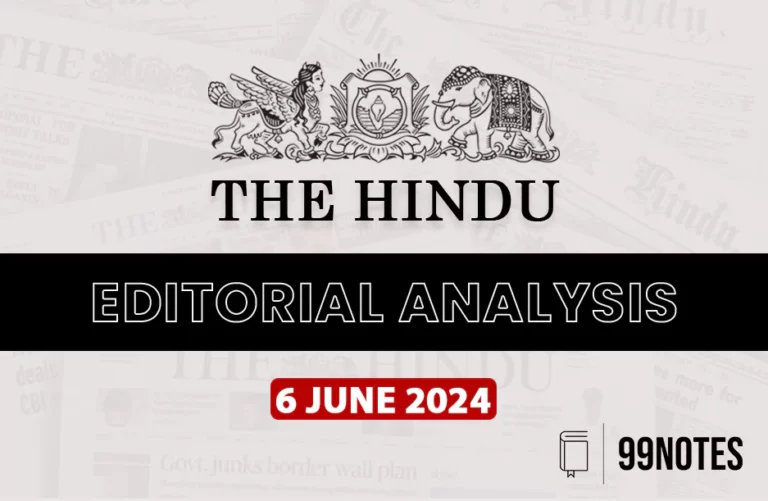12 February 2024 : The Hindu Editorial Notes PDF
The Hindu Editorial
12-February-2024
1. A privileged strategic partnership, without a gulf
| Topic: GS2 – International Relations – Bilateral Relations The India-UAE strategic partnership, covering diplomacy, trade, and global issues, holds significance for UPSC due to its geopolitical implications and economic ties. |
| Context |
|
Overview:
- Prime Minister Narendra Modi is set to visit the United Arab Emirates (UAE) on February 13-14, 2024.
- This marks Modi’s seventh visit to the UAE since 2015 and the third in the last eight months.
- The visit includes the inauguration of a temple in Abu Dhabi and Modi’s participation as the ‘Guest of Honour’ at the World Government Summit in Dubai.
Bilateral Relationship:
- India-UAE relationship has evolved into a prominent and strategic partnership for New Delhi.
- Close rapport between the President of the UAE, Sheikh Mohamed bin Zayed Al Nahyan, and Prime Minister Modi.
Religious and Cultural Ties:
- Inauguration of the Bochasanwasi Shri Akshar Purushottam Swaminarayan Sanstha (BAPS) temple in Abu Dhabi.
- UAE President donated a 27-acre plot of land for the temple.
- Second significant Hindu temple in the UAE, following the one in Dubai opened in October 2022.
Global Engagements:
- Modi to address the World Government Summit on February 14 as the ‘Guest of Honour.’
- Collaboration on global climate issues evident during Modi’s visit to Dubai for COP28.
- Co-launch of the Global Green Credit Initiative.
Economic Partnership:
- Bilateral trade grew to $85 billion in 2022-23, making the UAE India’s third-largest trading partner.
- UAE is India’s second-largest export destination.
- India-UAE Comprehensive Economic Partnership Agreement aims to increase trade in services to $115 billion in five years.
- Approval of a bilateral investment treaty on February 1, 2024, to boost economic engagement.
Fintech Collaboration:
- Acceptance of RuPay card in the UAE since August 2019.
- Rupee accepted for transactions at Dubai’s airports from July 2023.
- Operationalization of a rupee-dirham settlement system in August 2023.
Energy Security:
- UAE is India’s trusted partner in energy security.
- Strategic oil reserves stored in India.
- Agreement signed with Abu Dhabi National Oil Company to invest in the strategic crude oil storage facility in Mangaluru.
Defence, Security, and People-to-People Ties:
- Strong cooperation in defence and security.
- Both countries have made exceptions for each other on various occasions, showcasing mutual respect.
- Exchange of honors, with Modi receiving the UAE’s top civilian honour, the Order of Zayed, in 2019.
Strategic Ties and Regional Cooperation:
- Both nations part of significant groupings, including I2U2 (West Asian Quad) and India-Middle East-Europe Economic Corridor (IMEEC).
- UAE’s participation in the G-20 summit under India’s presidency in September 2023.
- Collaboration on the IMEEC infrastructure project, connecting India to Europe.
Critical Time and Future Outlook:
- The Prime Minister’s visit to UAE comes at a critical time amid the war in Gaza.
- India and UAE share a unique strategic partnership with few major issues of divergence.
- It is evident that the privileged strategic partnership is set to grow stronger in the years ahead.
| India – Gulf Countries Relations |
Prospects:
Challenges:
Way Forward:
|
| PYQ: How will I2U2 (India, Israel, UAE and USA) grouping transform India’s position in global politics? (250 words/15m) (UPSC CSE (M) GS-2 2022) |
| Practice Question: Critically examine the prospects and challenges in India’s relations with Gulf countries, suggesting how India can navigate this complex partnership for mutual benefit. (150 words/10 m) |
2. How women can be represented in politics
| Topic: GS2 – Social Justice – Vulnerable Sections – Mechanisms, laws, institutions and Bodies constituted for the protection and betterment of these vulnerable sections. The Women’s Reservation Bill’s challenges offer insights into gender dynamics in politics, critical for UPSC aspirants. |
| Context |
|
Introduction:
- Women’s Reservation Bill passed in Parliament last year, settling the debate on increasing women’s representation in politics.
- Recent Rajasthan Assembly elections highlighted the challenges despite the bill’s passage.
Rajasthan Assembly Elections:
- Both Congress and BJP women candidates performed poorly in the elections.
- BJP’s success rate for women candidates was 45%, lower than the 60% for male candidates.
- Congress had a 32% success rate for women candidates.
- Total women MLAs reduced to 20 in the current Assembly, four fewer than the outgoing Assembly.
Voter Preference and Party Enthusiasm:
- Voters and political parties showed low enthusiasm for women candidates despite the Women’s Reservation Bill.
- Parties were not enthusiastic about fielding more women candidates, and voters were not keen on electing them.
Head-to-Head Contests:
- In seven constituencies where BJP and Congress women candidates competed, the parties won an equal number of seats, showing a voter preference for male candidates.
- BJP’s overall vote share reduced in these constituencies, indicating a preference for male candidates.
Male Candidates vs. Female Candidates:
- Congress performed better when fielding male candidates against BJP’s women candidates, and BJP had higher success rates with male candidates against Congress’s women candidates.
- A vote bloc exists preferring male representatives, impacting the winnability of women candidates.
Lack of Contagion Effect:
- Distributing more tickets to women may not necessarily increase women’s representation in legislatures.
- Examples from West Bengal and Uttar Pradesh elections show that gender quotas do not guarantee higher representation.
Conclusion:
- Despite the Women’s Reservation Bill, challenges persist in increasing women’s political participation.
- Voter preferences and party strategies indicate a reluctance to support women candidates, especially in closely contested battles.
| Women’s political participation in India |
Importance:
Challenges:
Way forward:
By overcoming these challenges and implementing effective strategies, India can achieve greater women’s political participation, leading to a more equitable, representative, and prosperous democracy. |
| PYQ: “The reservation of seats for women in the institutions of local self- government has had a limited impact on the patriarchal character of the Indian political process.” Comment. (250 words/15m) (UPSC CSE (M) GS-2 2019) |
| Practice Question: Discuss the challenges and implications of the Women’s Reservation Bill in light of the recent Rajasthan Assembly elections. (150 words/10 m) |
For Enquiry

13 Feb 2024 : Daily Current Affairs Quiz

13 Feb 2024 : Daily Answer Writing

13 Feb 2024 : Daily Current Affairs

13 February 2024 : The Hindu Editorial Notes PD

13 Feb 2024 : Indian Express Editorial Analysis

13 February 2024 : PIB Summary for UPSC

12 Feb 2024 : Daily Current Affairs Quiz

12 Feb 2024 : Daily Answer Writing

12 Feb 2024 : Daily Current Affairs

12 Feb 2024 : Indian Express Editorial Analysis
Daily Quiz 13 Feb 2024 : Daily Current Affairs Quiz 13 Feb 2024 : Daily Quiz…
mains answer writing 13 Feb 2024 : Daily Answer Writing Mains Answer Writing
13-February-2024
Q1) With the help of a map, show major ocean currents of the world….
Daily Current Affairs 13 Feb 2024 : Daily Current Affairs Daily Current Affairs
13-February-2024- Top News of the Day
1. Indian Navy Personnel Released from Custody…
Feb 2024 The Hindu 13 February 2024 : The Hindu Editorial Notes PD The Hindu Editorial
13-February-2024
1. A global alliance to bridge the gender equity gap
Topic:…
Indian Express 13 Feb 2024 : Indian Express Editorial Analysis Indian Express Editorial Analysis
13-February-2024
1. A science for us
Topic: GS2 – Governance…
feb 2024 PIB 13 February 2024 : PIB Summary for UPSC PIB Summary for UPSC
13-February -2024
1. Union Minister G Kishan Reddy inaugurate regional centre…
Daily Quiz 12 Feb 2024 : Daily Current Affairs Quiz 12 Feb 2024 : Daily Quiz…
mains answer writing 12 Feb 2024 : Daily Answer Writing Mains Answer Writing
12-February-2024
Q1) “Water scarcity threatens economic and social gains…
Daily Current Affairs 12 Feb 2024 : Daily Current Affairs Daily Current Affairs
12-February-2024- Top News of the Day
1. Great Indian Bustards give Nandyal a…
Indian Express 12 Feb 2024 : Indian Express Editorial Analysis Indian Express Editorial Analysis
12-February-2024
1. CLASSROOM VS COACHING
Topic: GS2 – Social…




